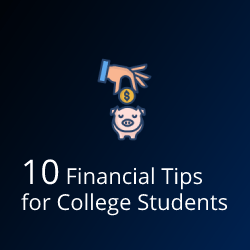College is not only a good time to get your education and make new friends that will last, but it’s also the right time to start building your financial habits.
These habits will stay with you even after college.
Simply put you should work on your saving and spending habits and work toward clearer and bigger goals.
While of course, your main focus should be getting your education, you shouldn’t avoid the opportunity to develop skills that you will desperately need after finishing your studies.
Luckily there are a few tips that can help you.
1. Take Control
It’s very easy to neglect the financial situation you are in right now, especially due to other challenges that you will meet during your college life.
However, this shouldn’t stop you from taking control of your hands.
Even, if some of the expenses are paid by your parents (tuition, room, etc.) you have to start planning your financial strategy the first day you start.
2. Get a Part-Time Job
It’s pretty clear that the time of many students is limited, but getting a part-time job can go a long way.
Actually, most international students get part-time jobs.
Think like this, not only you will be able to save a lot more money faster, but also you will have your own money that you can reward yourself after you reach a specific goal.

3. Save Time by Hiring a Professional Essay Writing Service
Writing assignments can cost you a lot of time and this means you won’t be able to work more on your part-time job and you won’t have time to study other subjects and papers will start to pile up.
You can easily hire a professional essay writing service online, such as CustomWritings, and they will need a lot less time to write your essay and still, you’ll get an amazing piece written.
4. Work on Your Budget
This is important in order to determine how much money you have coming from different sources like relatives, parents, scholarships, loans, etc.
So, calculate the income.
Next estimate what are your expenses for toiletries, food, bills, books, even entertainment, and others.
Write everything down and balance them according to your income.
Use the first step and take control when you spend money next.
5. Open a Savings Account
A lot of people struggle with this after college, and that’s why it’s essential to build it as a habit while you are working on your academic skills.
However, don’t save money after you spent on all your necessities.
After budgeting, put some money in your savings account and then buy what you need.
In this way, it will be easier to save some money.
6. Cook Often
It’s custom for students to make their own food, well because it’s a cheaper alternative.
But actually, even cooking yourself can get out of hands, especially if you start over buying food that you later end up throwing away.
So, make a list of the food you like and choose the ones that will be within your budget.
Also, don’t overbuy, you don’t want to end up with spoiled goods later.
7. Buy Used Textbooks
Textbooks take most of your budget and it’s understandable that you must get them.
However, instead of buying them new, get them second-hand at a reduced price.
If you must buy the textbook new, do it online because usually campus prices are most of the time higher.
The same goes for equipment like refrigerators, microwaves, etc.
When you are moving into your new dorm and if someone is moving out ask them to sell their coffee pot, refrigerator, etc.
They will also need the money and you need cheaper too.
8. Take Advantage of Being a Student
There are a lot of discounts for students at local businesses.
You can also check online for student travel, clothing, books, food, and even entertainment deals.
Keep coupons and use them.

9. It’s Time to Build Your Credit Score
No, it’s not too soon, it’s just the right time to do it.
This is because your credit score will be a huge factor after you finish your studies.
You’ll need to get a car, a house, or an apartment and without a good credit score, you won’t be able to do so.
How to build it? Make small payments if you have financial aid or student loans, even if it is only $30 – 5- a month.
It will leave a positive history on your record.
However, if you don’t have any loans use your credit card to make small purchases and pay them within a month.
10. Always Protect Yourself
Always have your eyes opened when you are around campus, or even in your own room.
Don’t just leave cash lying here and there.
Be skeptical of other people, especially those who asked you for money.
Also, be careful of identity theft, especially if you shop online or in a bank.
For even more protection keep cash stashed somewhere in a safe space for emergencies, and don’t be late with parking tickets and livery books, you don’t want to spend more money on the fees.
Lastly, create a routine that you can follow, don’t overpower yourself, and start small.
Keep records of what you have spent on and what you have left for spending.
These tips will really help you but only if you take control of your actions and plan smart.



